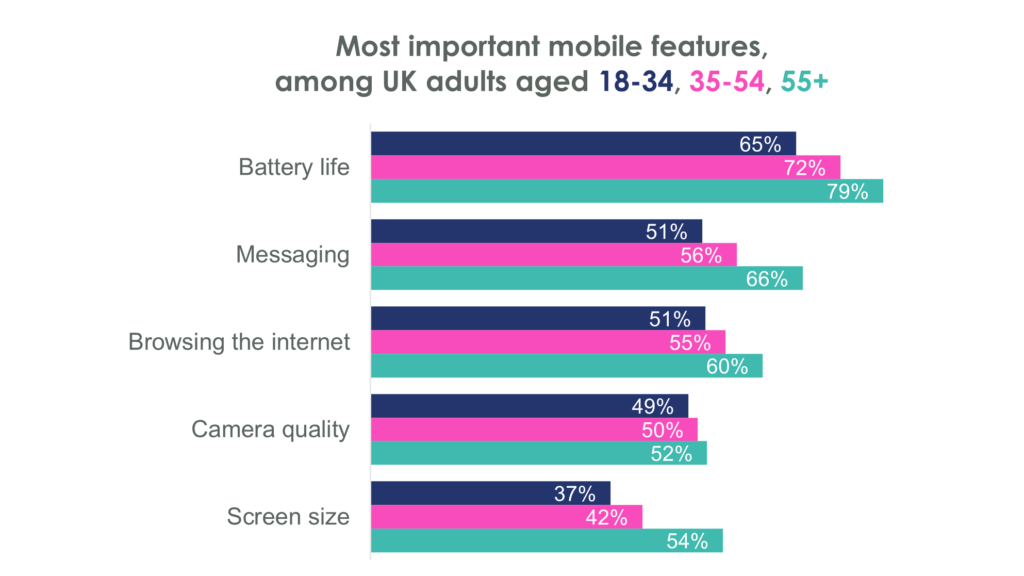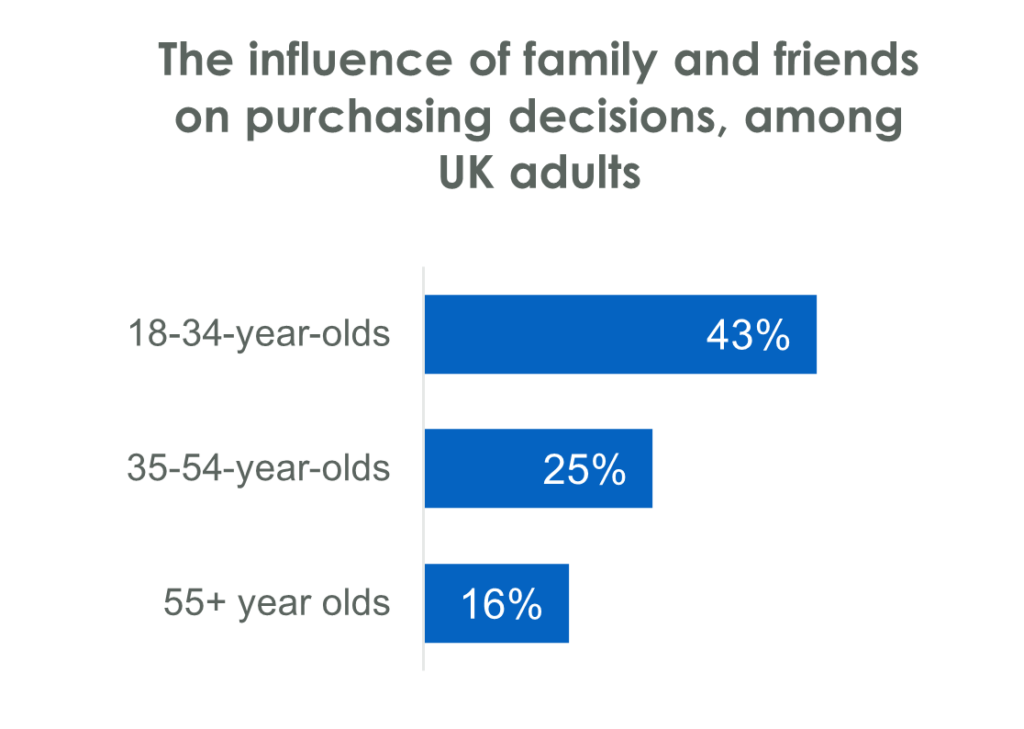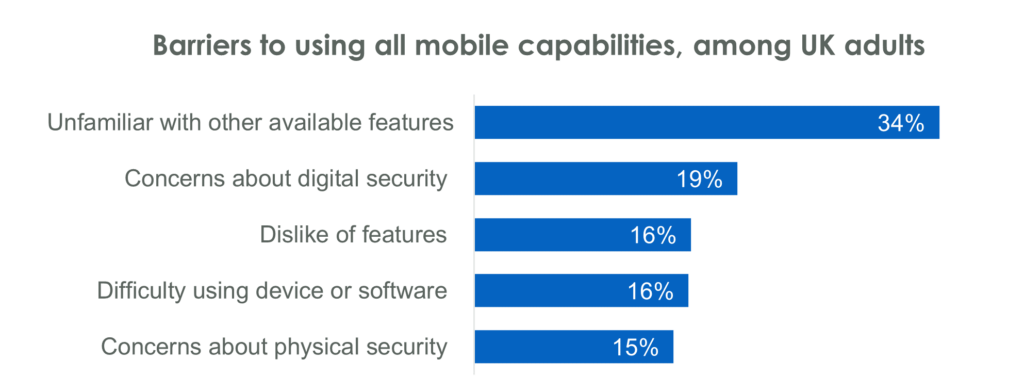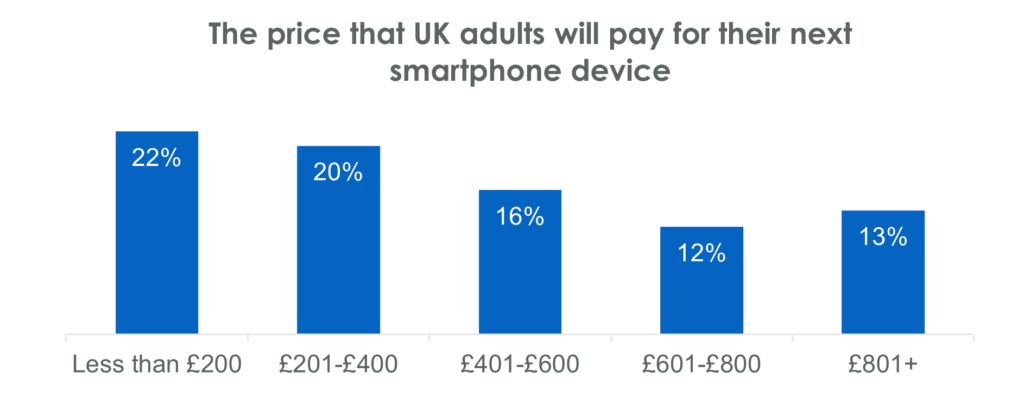Smartphone Adoption and Consumer Preferences

Older Consumers Shaping the Future of Mobile Technology
Hidden Dynamics in the UK Smartphone Market
UK smartphone ownership is at an all-time high, with 95% of those aged 18-54 owning a smartphone. However, focusing solely on ownership statistics may overlook diverse consumer needs and preferences. Certain regions and age groups still have significant minorities using feature phones, revealing a more varied market. For example, 5% of all UK adults, particularly those aged 55+ (8%), rely on basic feature phones. This figure reaches 11% in Newcastle and 12% in Cardiff, suggesting an opportunity for a modern, simplified phone catering to users who prefer more straightforward devices.
Diverse Needs Among Older Users
Battery life is the most valued feature across all age groups. Practical functions like messaging, internet browsing, and camera quality are consistently important to users of all ages. However, older 55+ users place greater emphasis on these features, with messaging (66%), browsing (60%), and camera quality (52%) more critical to them than to younger users, who value these at 51%, 51%, and 49%, respectively. This suggests a wider range of tech familiarity within the older demographic, as highlighted by the differences in feature priorities.

Screen size also holds significantly higher importance for those aged 55+ (54%) compared to 18-34-year-olds (37%), potentially due to accessibility needs such as vision. Additionally, while camera quality is often associated with younger users, it is more important to those aged 55+ (52%) than to the 18-34-year-old demographic (49%).
Features vs. Functions: A Generational Gap
A considerable difference exists between older and younger users in how they perceive features versus functions. Younger adults aged 18-34 are far more engaged with cutting-edge features such as gaming (34%), AI (14%), and health tracking (20%), indicating a growing expectation for smartphones to integrate seamlessly with all aspects of their lives. This contrasts with the older 55+ group, who use smartphones more selectively for practical purposes.
Interestingly, only 42% of those aged 55+ feel they are using their smartphones to their full potential, compared to 60% of 18-34-year-old users. This suggests a potential market for brands to create accessible yet innovative features for older consumers, combining ease of use with new technology.
Affordability: A Broader Concern than Just Price
Affordability is a pressing concern, with 83% of UK adults feeling that the latest smartphones are too expensive. This sentiment is particularly high among those aged 55+ (90%), compared to 72% of the youngest group, 18-34-year-olds. These younger users, although typically with less disposable income, seem more understanding of the price due to the versatile roles their phones play within their lives.
Nearly one in five UK adults (17%) and 26% of those aged 55+ are uncertain about their spending limit on a new smartphone, presenting an opportunity for brands to appeal to this demographic through features and sustainable practices beyond price alone. Brands promoting refurbished models could tap into this price-sensitive market, as 49% of adults are open to purchasing them, especially among those considering lower-end devices (57%). However, interest in refurbished phones is slightly lower among older 55+ year old adults (46%).
Declining Brand Loyalty
Brand loyalty shows a notable generational divide. Overall, 49% of UK adults feel connected to their smartphone brand, with this figure dropping to 41% for those aged 55+. Moreover, younger users 18-34 (56%) are more likely to feel attached to their smartphone brand compared to older adults, with only 27% of those aged 55+ preferring their mobile brand to match their other tech devices, in contrast to 54% of younger 18-34-year-old UK adults. This points to a desire for seamless integration among younger consumers and highlights an opportunity for new brands to attract customers by focusing on functionality, value, and user experience.
Influence of Word-of-Mouth Recommendations
Personal recommendations play a significant role in purchasing decisions, particularly for younger consumers. While only 22% of UK adults are influenced by traditional advertisements, 26% say word-of-mouth recommendations are a deciding factor, with this figure rising to 43% among 18-34-year-olds.
This demonstrates the importance of authentic brand experiences and community-driven marketing for capturing younger audiences.

Usage Potential and Tech Familiarity Among Older Adults
Interestingly, 18% of UK adults feel they aren’t fully utilising their smartphones, with this figure even higher among those aged 55+ (23%). Privacy concerns are also prevalent, with 19% of UK adults expressing concerns around digital security. Contrary to stereotypes, however, only 15% of those aged 55+ dislike their smartphone features, compared to 20% of younger 18-34-year-old users, and both age groups report similar difficulties navigating their phones (17% respectively). These findings suggest that brands can confidently market advanced technology to older users if it is presented in an accessible, straightforward way.

Budget Consciousness in Smartphone Spending
On average, UK adults are only willing to spend £449.10 on a new smartphone, considerably less than the price of the latest flagship models. Younger 18-34-year-old consumers are willing to stretch this to £586.60, while older 55+ year old adults prefer to cap their spending at around £340.20. This gap highlights strong demand for affordable devices that deliver essential features. As refurbished models gain traction, brands could capitalise on the interest in budget-friendly options by balancing affordability, value, and innovation.

UK consumers are increasingly interested in practical, affordable, and reliable devices. Whether through refurbished options, simplified features, or community-focused marketing, the potential for growth in the UK smartphone market is clear. As brand loyalty declines and affordability concerns rise, brands that prioritise consumer needs over prestige will likely lead the next wave of smartphone success.
Written by Colm Ryan, Research Executive at Opinium.



